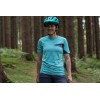The Ritchey Outback is a steel-framed, carbon-forked gravel and adventure frameset designed for everything from road to bikepacking and off-road touring, with all kinds of gravel in between. Its premium steel tubes and carbon layups have all the mounts you could want, and it's a supremely comfy ride – but even though updated for 2020, it's still lacking a few modern conveniences.
- Bikepacking kit on a budget: everything you need to bivvy for under £100
- The best gravel and adventure bikes you can buy for under £2,000
The Outback itself is not new, but for 2020 it's been updated with increased tyre clearance – it can now accept 650b wheels – a new carbon fork with mounting points, thru-axles front and rear, and disc brake flat mounts.
Ritchey is probably best known for its finishing kit and wheels, but framesets actually lie at the company's heart – founder Tom Ritchey is known to still love building and testing ideas himself, too.
The Outback sits alongside the Swiss Cross – more of a cyclo-cross and road frame – and is little more on the adventurous side.
There are some very classic/old (delete as applicable) design touches, including a straight 1-1/8” steerer on the fork, something almost never seen on new bikes. Also, the cable routing is fully external, with no option for Di2 cabling – or at least, not a clean-looking option.
Given the bike is for offroad use in all conditions, some riders – especially in the UK – might want a full outer cabling option to keep the shifting clean for longer. The routing from the rear is full outer up to the seat tube, then exposed inner along the top tube.
The reason is the butted tubing, which Ritchey says is too thin in the middle of the span for brazing a guide onto – so adding one would cause issues.
Does it matter? Some might think so, although we had no problems over more than 1200km in all weathers, and the inner's position above the top tube probably helps as it's relatively shielded. That said, it doesn't play well with the straps of some top tube bags, which is unfortunate given the Outback's intentions.
The seamless, triple-butted chromoly Ritchey Logic tubing is proprietary, and the thicknesses are frame-size specific too – the idea is to maintain the same ride feel and quality across all the sizes.
The result is incredibly smooth, even for a steel frame. Our test bike came fitted with Ritchey Speedmax 700x40mm tyres, which are not the fattest out there, yet comfort is outstanding.
It's a smooth ride that mutes trail feedback and bumps, while the front end is fantastic too – thanks in part to its less rigid, old-school straight steerer, and in part to the modern carbon fork.
The seat clamp is neatly integrated with the stays, and this not only looks great but proves very effective. The headtube and the way it blends is also pretty lovely to behold.
While the Outback may not have the same responsiveness as a carbon road bike, you certainly would not call it flexible. It responds well to hard pedalling, and feels quite spirited even on road rides.
The geometry also makes road riding quick and enjoyable, thanks to a short (130mm on our Small) headtube that allows racy riding positions, and an upright (73.5 degree) seat tube that makes long distance pedalling a breeze.
In the rough
Offroad it deals with rough, steep descents comfortably and, while not it's as slack as some, that compliant front end is confident and the overall feel is secure. With chainstays at 453mm (all sizes) and a wheelbase between 1046mm to 1081mm, it's a fairly long bike and consequently, it's very stable at speed.
This stability is particularly welcome with the bike loaded up, as it's sure footed even on the fastest descents, though it's not so good on really twisty singletrack or sheep tracks.
Claimed tyre clearance is 700x48mm, although we tried a 50mm WTB Venture and it fitted both front and back. Claimed clearance for 650b is 2.0”.
The Outback has mounts for mudguards and pannier racks, plus there's a third cage mount under the down tube – useful.
However, the bottle cage inside the downtube does not maximise the space – it could usefully sit lower in the frame and leave more room in the front triangle for a frame bag.
Overall the Ritchey Outback delivers a beautiful ride quality with luggage and touring-friendly features that lots of riders will appreciate.
Where it really delivers is on longer rides and bikepacking adventures, where the long wheelbase creates a very stable ride. It's a very rewarding frameset that's smooth, comfortable, and very enjoyable indeed.












